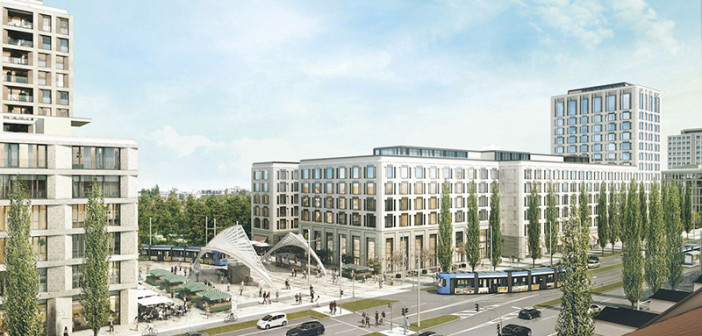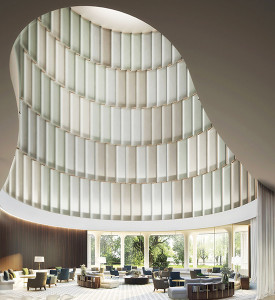INTERNATIONAL REPORT—Germany this year is celebrating the 500th anniversary of the Reformation, sparked, as legend has it, when 16th-century “rebel” Martin Luther on Oct. 31, 1517, stood in front of the Wittenberg Castle Church and nailed his “Ninety-Five Theses” to the massive doors. The self-published document criticized—some say condemned—the Roman Catholic Church on a variety of perceived wrongs, notably the then-practice of the sale of indulgences. The act was one of the seminal moments in the Protestant Reformation.
Five centuries later, its occurrence— and subsequent historical “fallout”—are giving rise to any number of activities in the country, the majority geared toward encouraging both domestic and international visitors to experience Germany.
For example, the German National Tourist Board (GNTB) has put together a guide segmenting the country into eight routes that visitors may travel to be immersed in a variety of Luther-centric offerings, from politics and rebellion to cultural heritage to sermons and Imperial diets. The Board also created a detailed guide—“Faces of Luther Country”—designed around all things Martin Luther vis-à-vis the Reformation, architecture, nature, cultural heritage, fine arts and food and beverage.
The 500th anniversary is expected to help reinvigorate the strong momentum Germany has been seeing on the visitor front, something that has not been lost on that country’s hotel owners and developers, as well as international players who have been flooding the country with projects, both independent and branded.
According to Petra Hedorfer, CEO of the board of directors of the GNTB, which is based in Frankfurt am Main, Germany, global conditions have proved challenging. “Since 2010, the demand for Travel Destination Germany as a brand has developed above average against international competition. Since the beginning of [2016], the difficult conditions of the world economy, sanctions, the topic of Brexit, plus the general security situation with terrorism, war and migration—have all presented challenges for tourism. In this context, even such a strong brand as Destination Germany is experiencing declining trends from various source markets. This is why, for the first time after more than six years of continuous growth, the upturn in German incoming tourism has slowed down.”
Still, data from the German National Tourist Office (GNTO) in New York regarding inbound visitors was positive through August (latest data available). According to the Federal Statistical Office, 55.3 million cumulative international overnight stays, in hotels with at least 10 beds, were logged in the time period, an increase of 1% compared to the previous year, with the U.S. showing an increase of 4.1% for this period in comparison with the previous year.
A recent collaborative report by Colliers International, Fairmas and Revinate on the German hotel market also noted a surge in visitors from China to Germany, which welcomed 2.5 million Chinese travelers in 2015. Revinate’s Thomas Landen noted, “After the European countries and the U.S., China is the largest market for inbound tourism to Germany. By 2025, the number of Chinese travelers is expected to double, making them Germany’s fifth largest tourism demographic.”
Fairmas’ Niels Schroder added domestic travel also has contributed to growth. “German hotel operators can be happy, thanks to growth over the past years. Already since 2010, the steady growth persists, and also this year [2016], the annual accrual growth trend can be pursued, albeit at a low level. One of the reasons is the continuing trend of domestic holidays, which is not new, but it is being spurred on additionally by the current events in Europe, as well as Germany. Because of security concerns, many people decide against the otherwise popular destinations in Turkey, Egypt and elsewhere,” he said.
In 2015, 389 new hotel projects were under way. Early in 2016, Lisa Huebner of the GNTO noted, “There’s a little hotel boom happening in Germany right now: 193 new properties (with at least two stars) planned for 2016.”
In Hamburg alone, 27 new hotels are slated to open in the next two years. Berlin, Stuttgart and Munich are also seeing an increase in new openings.
TopHotelProjects, a tracking firm that collects and manages data on hotel projects and chains on a global basis, noted Germany is capturing about one-third of all hotel construction projects that are underway in Europe, tagging the overall number of hotels in the pipeline for the country at 595.
Among the properties readied for 2016 was the Roomers Hotel in Baden-Baden, a wellness travel destination. The business hotel and spa is part of a small chain that has properties in Munich and Frankfurt.
Berlin-based AMANO Group added three more namesake properties in its headquarters city. These include the 108-room AMANO Grand Central Hotel in the Hackischer Markt; the Amano Home Apartmenthaus at Prenzlauer Berg with 34 apartments; and the Amano Friedrichstrasse in the Kreutzberg neighborhood, located near Friedrichstadt-Palast and the shops of Friedrichstrasse. The three-star hotel will offer 100 rooms and a bar.
The Sir Hotels chain, with properties in Berlin and Amsterdam, opened the 94-room Sir Nikolai in Hamburg’s Old Town. The upscale property features a spa and event space.
Last year was a banner one for Moxy Hotels in Germany. Marriott International, in cooperation with IKEA, slated five of the design-oriented hotels for the country. Locations included Munich Airport, Moxy Eschborn (near Frankfurt), Moxy Berlin Ostbahnhof, Moxy Frankfurt Gateway Gardens (at the airport) and Moxy Essen. Another Moxy is expected to open near Stuttgart Airport in 2018.
The hotel boom continues this year, particularly in major destination cities. Berlin, for example, is seeing a wealth of additional inventory. Among those coming to the area are the Hotel Capri on “Spree Island” (an island on the River Spree in the city’s center). Operated by Frasers Hospitality Group, the hospitality arm of Frasers Centrepoint Ltd., the extended-stay property will have 144 rooms on seven floors. Built on a historic site, the design includes a glass floor that reveals the remains of cellars and old town houses that used to stand there. The hotel’s exterior will reflect the former historic Cöllnische town hall from the 18th century.
The Hotel Estrel is adding 814 rooms to its existing 1,125 rooms via a 46-story tower, which, at 577 ft., will make it the tallest building in Berlin and the largest hotel in Germany. The addition is slated to open in late 2017/early ’18. The property features the Estrel Congress & Messe Center and the Estrel Festival Center, considered Europe’s largest hotel, congress and entertainment center.
Similarly, Hilton Worldwide will open its largest [to date]Hampton in early 2018 via a franchise agreement with developer Interstar Hotel GmbH. The 344-key, nine-story Hampton by Hilton Berlin Alexanderplatz will feature a 24/7 fitness center and HUB bar.
With more than 50 hotels in its portfolio, Germany-based Motel One will open one of its budget design hotels in Upper West at the Zoologischer Garten (zoo), its ninth property in Berlin. The 18-story hotel will offer 582 rooms with a terrace on the 10th floor.
In addition, a second new Motel One is planned near Alexanderplatz for fall 2017. The hotel will feature a sky bar on the 19th floor and, at 708 rooms, it will be the largest Motel One in Germany.
German boutique hotel chain Lindner Hotels & Resorts will open a 165-room hotel at Alexanderplatz later this year as part of VOLT Berlin, a mixed-use development that includes retail, restaurants and entertainment. Lindner also will open two of its “me & all” brand hotels this year in Mainz and Kiel.
UK-based IHG by year’s end will open Indigo Berlin City-East Side, a 119-key property located at the East Side Gallery, an open-air art installation created from the Berlin Wall. The emerging district includes a movie theater, a bowling center, restaurants and bars.
In Frankfurt, France-based Louvre Hotels Group will build its first Première Classe brand hotel in the Frankfurt-Niederrad district proximate the airport. Within walking distance of the Commerzbank soccer arena, the budget hotel will include 140 rooms.
Hamburg this summer will see the opening of luxury hotel, The Fontenay, at Alster Lake. A member of The Leading Hotels of the World, The Fontenay has 114 rooms and 17 suites with modern decor, a wellness area with infinity pool, a view of the lake and a 40-seat Michelin-starred restaurant.
Frasers Hospitality Group is transforming Hamburg’s heritage building, the State Financial Management Office, into a 147-unit suites hotel, with an opening expected by early 2018. Located near the Neuer Wall shopping district, it will be the Singapore chain’s third German property.
By year’s end, Hotel Pier 3 in HafenCity, Hamburg, will offer 212 rooms on six floors and a stage for entertainment in the emerging neighborhood of KPTN (for the German word for captain), that has apartments, restaurants, retail and a theater under development. The project is being overseen by hotelier Kai Hollmann (Fortune Hotel), Norbert Aust of Schmidt Theater and Schmidt’s Tivoli, and brothers Gerrit and Frederik Braun.
In Munich, the independent 26-room Geisel Privathotel Munich will open downtown this fall on two floors of a mixed-use project near town hall and the Viktualienmarkt gourmet market.
And on the brand side, local family-owned firm Jost Hurler Beiteiligungs und Verwaltungs GmBH & Co. KG will open an Andaz, a first for the Hyatt Hotels’ brand in Germany. The 274-key hotel will be part of a mixed-use project featuring retail, entertainment and apartments located in the city center’s Schwabinger Tor district. The Andaz will feature a restaurant and rooftop bar.
In addition to the Moxy, Stuttgart also will see a Jaz in the City hotel by Q2. The 175-room hotel will draw on the local music scene, bringing artists and their works into the hotel, which will be located within the city’s Cloud No. 7 apartment complex.
And Hyatt once again will expand in Germany, this time in Baden-Baden, following an agreement with Badriah Investments B.V. to develop a Hyatt-branded luxury hotel within a 16th-century castle. The 146-room Neues Schloss Baden-Baden hotel is being developed within the historic building, and an extension is being added that will offer guestrooms and private apartments, conference facilities, a pool, a fitness center and a restaurant. HB



